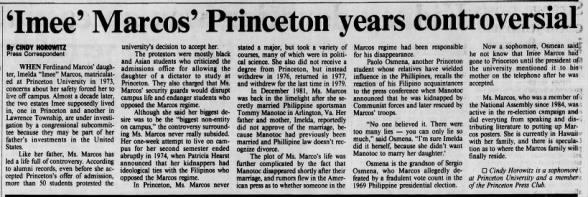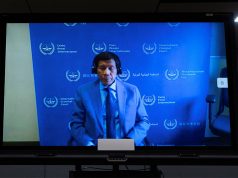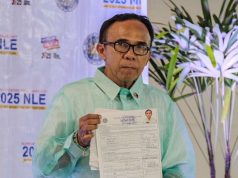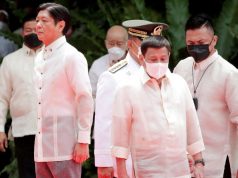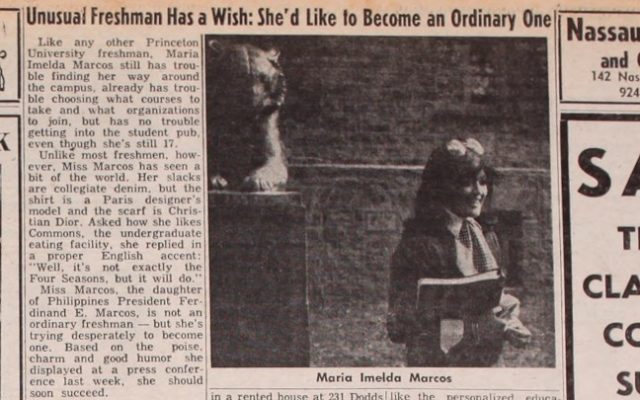
(Updated 3:00 p.m.) After a supposed picture of aspiring senator Imee Marcos’ scholastic records on Princeton University went viral, questions about her educational credentials arose as she aims to occupy a seat in the upper house.
A Filipino Reddit user previously shared what appeared to be a scanned copy of her grades during her enrollment in the prestigious university from January to May 1976.
Prior to the Reddit posting, however, the picture has been making the rounds on social media platforms without pointing to a clear reference or source.
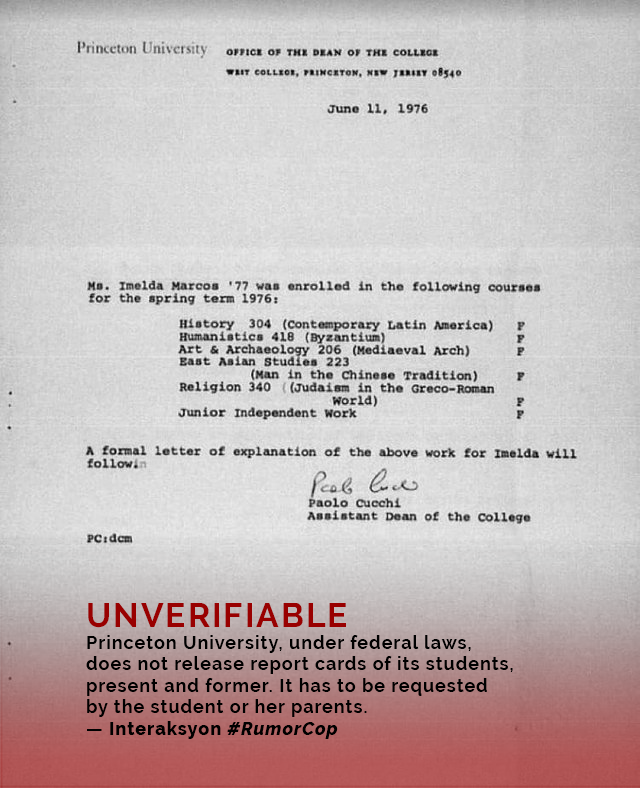
While reverse image searches have not supplied a result on the document’s possible origin, further verification by Interaksyon showed that it could not have been likely released by Princeton University.
According to the United States’ Family Educational Rights and Privacy Law, a student’s scholastic records can only be disclosed with the permission of the student herself or her parents.
Educational institutions receiving federal funds under the United States’ Department of Education are bound by the decree which requires a written permission from the student or parent prior to the releasing of records.
These include information related to the academics, tests, question booklets, attendance, departmental, health, finance and any aspect of the student’s campus life.
Interaksyon reached out to the camp of Marcos to ask for a comment, but there has been no response on the document’s validity.
When at Princeton
The governor of the Ilocos Norte in her official biography on her Facebook account and defunct website claims that she “is one of the first female graduates from an Ivy League School—Princeton University, graduating with honors.” It is not yet clear if the same is indicated in her personal data sheet as a government official.

However, correspondence with the university showed that the aspiring senator did not earn a degree—although she attended the school for a number of years. An email from the university’s archives reads:
“I included all the information within her file that I am permitted to release to you, but she did not earn a degree.”
Princeton further confirmed that the eldest of Marcos’ three children went to the university from the fall of 1973 to spring 1976 and the fall of 1977 to spring of 1979.
Her major field was an Independent Concentration in Religion and Politics, which does not correspond to an undergraduate degree.
In Princeton, a concentration refers to the major or course of a student. An independent concentration, on the other hand, is reserved for students who have “strong” academic backgrounds and can satisfactorily develop a detailed and rigorous plan of study with the supervision of at least two faculty members.
These concentrations are special features of the undergraduate program leading to a degree.
The details from the university matches an old newspaper clipping of Asbury Park Press, which reported that Marcos “took a variety of courses, many of which were in political science.”
She “withdrew in 1976, returned in 1977, and withdrew for the last time in 1979,” Asbury Park Press’s report further states.
Controversial freshman
Months before she entered Princeton in 1973, Marcos’ enrollment was already being opposed by Asian and African-American students who cited her father Ferdinand Marcos’ consolidation of power in the Philippines after declaring martial law in 1972.
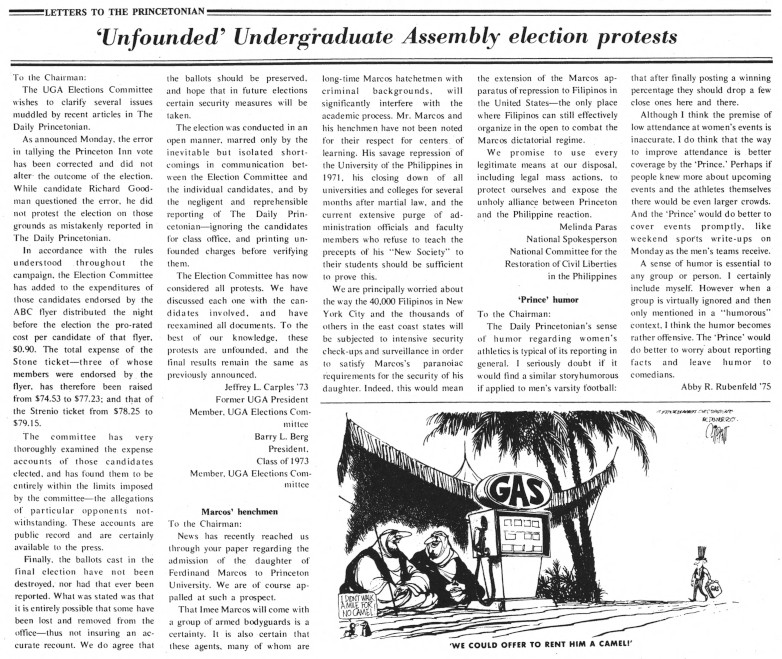
In a column titled “Letters to the Princetonian” in the Daily Princetonian on April 26, 1973, the Undergraduate Assembly Elections Committee expressed strong dismay over Imee Marcos’ admission into the university. An excerpt of it reads:
“Mr. Marcos and his henchmen have not been noted for their respect for centers of learning.”
“His savage repression of the University of the Philippines in 1971, his closing down of all universities and colleges for several months after martial law, and the current extensive purge of administration officials and faculty members who refuse to teach the precepts of his ‘New Society’ to their students should be sufficient to prove this.”
Another letter addressed to the university chairman dated April 10, 1973, questioned the university’s “refusal” to either confirm or deny her admission.
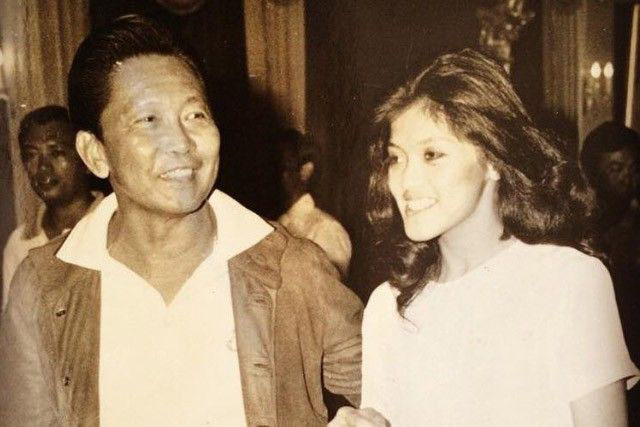
Moreover, it cited Marcos’ “empire of corruption” and how he managed to make himself a “president for life” under the 1973 Constitution, acknowledging that Marcos’ admission into the university might possibly imply that she was enrolled “on money extorted from her own people.”
The students also expressed their concern over the amount of security detail expected to follow the eldest presidential daughter and cited that the university does not allow guns within the campus as part of its regulation.
They recalled an incident that prompted them to raise their arguments, of which its excerpt reads in “Letters of the Princetonian” published on April 9, 1973:
“Several years back, another Ivy League university had to ask the son of a Latin American dictator to leave because of the disruption in campus life which his ‘security needs’ created.”
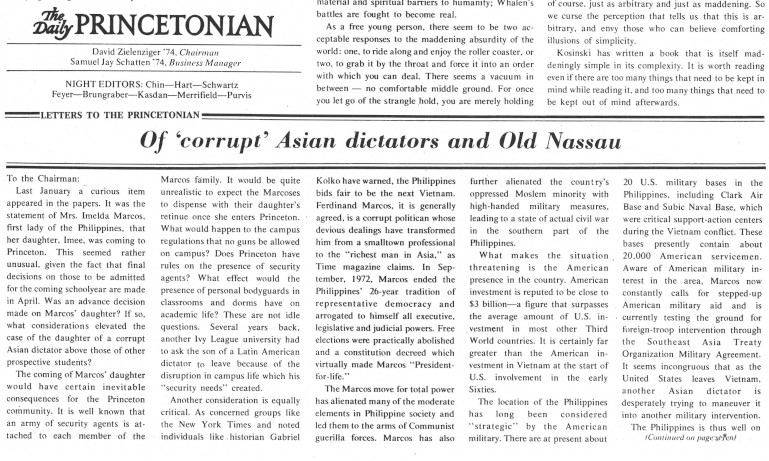
The students’ protests paid off. Or at least it appeared so. An armed security detail did not tag around Imee Marcos while on campus. She was instead driven around by an unarmed chauffeur.
A year after, a Philippine military attaché in charge of negotiating Imee’s security arrangements was accused of spying and “blacklisting” other Filipinos in the United States. It was an attempt to ensure that no one would “pose a threat to her” upon her stay in Princeton.
Problematic living arrangements
Upon her first few days in Princeton in 1973, Imee initially stayed off-campus on Dodds Lane despite being originally designated at Pyne Hall, a student dormitory. The rather extraordinary arrangement was to accommodate needs for her security.
She was “driven to and from the university by a Filipino chauffeur,” based on a letter from Philippine consul general Ernesto Pineda to the university’s Dean of Student Affairs.
By February 1974, Imee moved into a dormitory within Princeton in the hopes of living like a normal student. She was granted a single room with an access to the street complete with a readily available car.
After 13 days, however, she was forced to return to her private home on Dodds Lane after newspaper heiress Patricia Hearst was kidnapped by the Symbionese Liberation Army.
The rebels were alleged to have “ideological ties with the Filipinos who opposed the Marcos regime,” Asbury Park Press reports.
Hearst was a sophomore major at the University of California who was engaged with a track star of Princeton.
Imee’s off-campus residences were eventually visited by lawyers in 1986, following the people’s revolution in the Philippines. The lawyers represented the new Philippine government under President Corazon Aquino, who called for a recovery of the Marcoses’ ill-gotten properties in the United States. — with Camille Diola

